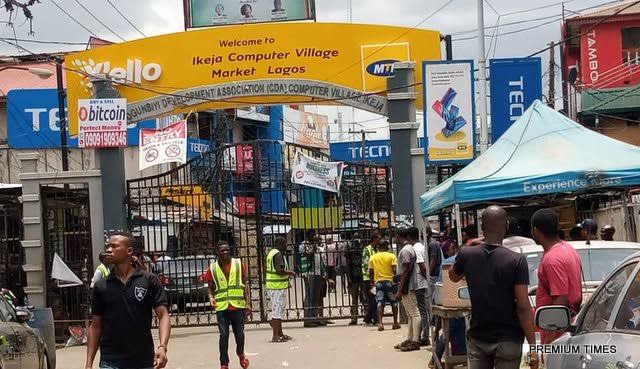The Lagos State Government has revived a long-standing plan to relocate Computer Village, Nigeria’s largest technology market, from its current base in Ikeja to a 15-hectare site in Katangowa, Agbado/Oke-Odo. Traders have been given 18 months to vacate.
The government says the move will bring order, infrastructure, and security to a market that has long outgrown its location. For traders and residents, however, the stakes run far deeper.
The consequences of uprooting a market that generates thousands of daily transactions and sustains a vast network of businesses are complex. Economic and security implications will shape outcomes for both the community being vacated and the one receiving the influx.
The Scale of Computer Village
Computer Village is often described as the largest ICT accessories market in West Africa. At its peak, estimates suggest the hub records more than 10,000 business transactions daily, ranging from wholesale imports of laptops and smartphones to low-margin repairs and resale of accessories.
Thousands of direct and indirect jobs are tied to the market including but not limited to traders, apprentices, food vendors, transporters, real estate owners, and logistics firms.
Its effect has created a self-sustaining ecosystem. Traders rely on dense networks of suppliers and technicians, while customers benefit from price competition and variety. Apprenticeship systems make it a training ground for the next generation of ICT workers.
This concentration of human capital is what urban economists call an “agglomeration advantage” – efficiency and innovation that emerge from density.
Understanding the Case for Relocation
The Ikeja site was originally a residential area, gradually taken over by traders since the early 1990s. As Computer Village expanded, it brought wealth, jobs, and recognition.
But the same density has overwhelmed Ikeja’s infrastructure. Narrow roads are choked by traffic, residential areas have been swallowed by commercial activity, and reports of theft, counterfeit devices, and crowd safety issues have persisted. The Lagos State Government argues that moving to Katangowa will fix these problems.
“The government wants your cooperation to ensure the relocation comes to pass. The time is now,” said Gbolahan Oki, Permanent Secretary of the Lagos Ministry of Physical Planning, during a recent stakeholders’ meeting. It was also noted that the new market would have facilities including a police post, hotels, and access to a BRT terminal.
For the state, the move is not just about decongestion. It is also about correcting decades of informal growth. By formally zoning and equipping the market, Lagos hopes to create a safer, more organized tech hub that aligns with its mega-city ambitions.
What Ikeja Stands to Lose
Yet, the loss for Ikeja could be immense. Computer Village is more than rows of shops; it is the anchor of an entire local economy. The spillover includes transport operators, food vendors, real estate owners, and thousands of apprentices learning technical trades.
“I’ve been here for over 12 years. This place is like my second home,” Solomon Adewale, who sells and repairs smartphones, told Techparley. “If they take us to Katangowa, I’m not sure my customers will follow me. Many people come here because it is close to the airport, close to the Mainland. Moving means starting over.”
Urban experts warn of the “hollowing effect.” Without Computer Village, Ikeja may lose its identity as Lagos’ tech district. Vacant shops could fall into disuse, and the vibrant networks of trust and apprenticeship might scatter. While redevelopment could eventually raise property values, experts say the transition may leave a vacuum.
What Katangowa Stands to Gain — and Risk
For Katangowa, the relocation represents a potential transformation. The site, historically known for a sprawling secondhand clothes market, could now become Lagos’ official ICT hub. A planned market with modern infrastructure could attract investment, improve order, and generate new opportunities for the host community.
Mrs. Blessing Okoro, who runs a small phone accessories shop in Computer Village, is cautiously optimistic about the transition to Katangowa.
“If the place has good roads, light, and security, then maybe it will be better for us,” she told Techparley. “Here in Ikeja, rent is high and we struggle with power supply. If Katangowa is well planned, it could help small businesses like mine.”
But many remain skeptical. Reports over the years have suggested that Katangowa’s infrastructure lags behind the promises. Traders fear moving into a half-prepared site could cripple their businesses.
Transport access is another concern. Ikeja’s centrality makes it a natural magnet for customers from all over Lagos; Katangowa, further out, may struggle to replicate that pull.
The Security Question
Security is central to the debate. Computer Village has long wrestled with issues of theft, counterfeit goods, and crowd control. The government insists the new site, with a police post and better monitoring, will be safer.
Adewale Adesola, an urban planning expert, believes the relocation could improve security, but only if promises are fulfilled.
“Relocating such a large market is delicate. You can create a safer environment with CCTV, controlled access, and police presence. But if you simply move traders without adequate systems, the same problems will repeat themselves in Katangowa,” he told Techparley.
Adesola also warns of unintended consequences.
“In Ikeja, abandoned spaces could attract criminal activities if the transition is poorly managed. Both locations must be planned for, not just the new site.”
Balancing Growth and Survival
The relocation plan is not new. Since 2006, successive administrations have promised to move the market, citing congestion and zoning conflicts. Yet, repeated delays reflect the complexity of uprooting a cluster that thrives precisely because of its organic networks.
For traders, survival is the priority. Relocation means new shop rents, moving costs, and uncertainty about customer loyalty. For residents in Katangowa, it means an influx of traders, buyers, and traffic, with opportunities and challenges intertwined.
As the 18-month window ticks, the Lagos State Government faces a pivotal test. Industry leaders say success will depend on whether the Katangowa site is genuinely ready, whether costs are bearable for small traders, and whether Ikeja is redeveloped without neglect.
Knowing the Numbers
On the national stage, Nigeria’s ICT sector is expanding at a remarkable pace. According to the National Bureau of Statistics, ICT contributed about 17.68 percent of Nigeria’s GDP in 2024, with telecommunications as the largest sub-sector.
Projections suggest that the Nigeria ICT market will grow to nearly $76.14 billion by 2030, reflecting a compound annual growth rate of around 18.32 percent. This makes ICT one of the fastest-growing segments of the country’s economy.
Taken together, analysts say these numbers underline both the importance and the fragility of Computer Village within Nigeria’s broader ICT ecosystem. Its contributions to employment, commerce, and technology adoption are substantial, and any disruption to its operation will have consequences beyond Ikeja and Katangowa.
Relocating the market therefore carries national economic implications, reinforcing why the government’s handling of the process will be closely watched. The outcome will determine whether the city strengthens its tech economy or weakens one of its most iconic marketplaces.





